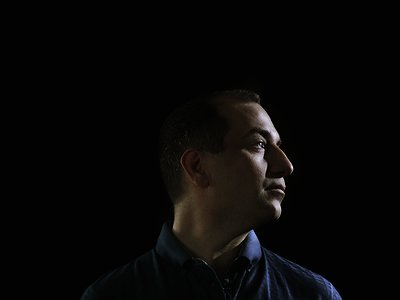Name: Marc Houle
Nationality: Canadian
Occupation: Producer
Current Release: X-Rays with Sian [as Marsian] on Octopus
Recommendations: Koyaanisqatsi also known as Koyaanisqatsi: Life Out of Balance, is a 1982 American experimental film directed by Godfrey Reggio with music composed by Philip Glass and cinematography by Ron Fricke.
This is the film that most changed my life. After hearing it I got sucked into the world of synths more than ever.
Nude Descending a Staircase, No. 2 is a 1912 painting by Marcel Duchamp.
I had never seen motion captured so well in a painting before this one. It instantly made me a follower of him and made me appreciate the futurist movement while before i hated it. He’s cool.
Website / Contact: If you enjoyed this interview with Marc Houle, check out his facebook page for more information.
When did you start writing/producing music - and what or who were your early passions and influences? What is it about music and/or sound that drew you to it?
I started when it was very little but playing drums. It wasn’t till I was in my early teens that I got into synths. There was always a piano around the house so it was great to learn how to make songs and melodies but when I got my first Casio it changed everything.
My sister was big into New Wave so I really picked up on all the synth and drum machine sounds I was hearing and got into replicating them all at home. I still love making Synth Pop because it allows me to layer synth lines and do some solos that wouldn't translate well into the techno world just yet.
For most artists, originality is first preceded by a phase of learning and, often, emulating others. What was this like for you? How would you describe your own development as an artist and the transition towards your own voice? What is the relationship between copying, learning and your own creativity?
I think originally I knew I wanted to make music but didn't have any lessons or anything, so I just sat in my bedroom playing around creating my own stuff for fun. If you create enough music, your style will show through and even if you try copying someone else it will somehow sound like you. I remember when I first started learning computer production I would take a song and try to replicate it. It really taught me how to get sounds down exactly the way I heard them. It’s also great to listen to so many different types of music because you are influenced from all over and not just recreating what you hear.
What were your main compositional- and production-challenges in the beginning and how have they changed over time?
When I started I had the same keyboard for years. Later on, by going to pawn shops in Detroit I was able to find new sounds but it was so slow going. I would maybe get a new piece a year. I really learned to master that 1 piece obviously but now it’s kinda amazing to have access to pretty much anything out there almost immediately. I’m kinda happy I took the slow route because I was able to really understand how to make a sound instead of just choosing a premade one from a list of thousands.
What was your first studio like? How and for what reasons has your set-up evolved over the years and what are currently some of the most important pieces of gear for you?
Originally it was mostly midi based. I was really into midi because I was able to multitrack for the first time. I was able to control multiple keyboards using an 80s home computer. It all ran through a tiny mixer and straight to a stereo tape deck. Later on, as I got more into sounds I started buying pre-midi gear and started to sync stuff together using a 707. Now I have the luxury of recording separate tracks and I’m not stuck with my 2 guitar pedals as my only effects.
I still think that the Juno-60 is my favourite piece of gear. The pads with the chorus are so beautiful but you can still patch up a punchy rolling bassline. I use my eventide reverb all the time and I’m loving the Acme-4 to add shuffle to my 808 along with anything else triggered by it.
How do you make use of technology? In terms of the feedback mechanism between technology and creativity, what do humans excel at, what do machines excel at?
Some people stick to digital only and others are analog purists but I find if you can bridge the two, you get something special. I’ve always used computers in my productions because I really like to visualize everything on screen. Computers really help me organize my ideas and I still find copying and pasting a huge luxury. I’ve noticed over time I’ve become much better at arranging and getting my ideas from thought to reality. The fact that it took me so long means that it was a learned thing and that I shouldn't take for it granted.
Production tools, from instruments to complex software environments, contribute to the compositional process. How does this manifest itself in your work? Can you describe the co-authorship between yourself and your tools?
I try to never fall in a rut and do things the same way every time. I might trigger synths with drum pads or use an analog step sequencer or start off with a drum machine. There are so many ways to start and so many combinations available that it’s always a fresh experiment. I think having a technology based music environment means that I’m not just creating but also exploring. Music to me has always been a balance between art and math and when you have so many option available the math part opens up, leaving more room for sound. Whenever I find myself in a rut I just think of a new way to get the notes into the machines and I’m good.
Collaborations can take on many forms. What role do they play in your approach and what are your preferred ways of engaging with other creatives through, for example, file sharing, jamming or just talking about ideas?
To work with someone else you have to trust that they’ll not only contribute equally, but also add an element that you can’t do alone. So before any work begins, you kinda have to know the person and what they can offer. You can usually tell that by the music they themselves make. After that I like to share files back and forth. I’m not always in the perfect mind set to make music and if someone is there waiting on me, it might be frustrating. This way I can think about the song all day and when I know what to do, I can get right to it. I’ve been pleasantly surprised by what has come out in the past that way.



